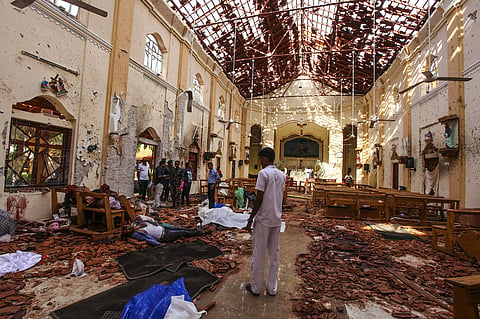

The dreaded Easter Sunday serial blasts which shook the island nation of Sri Lanka will go down in history as a black day. The eight bombs that ripped through Colombo, Negombo and Batticaloa claimed 290 lives and left 500 injured.
Also, 33 foreigners, including at least seven Indians, died in the cowardly attack suspected to have been carried out by a local Islamist outfit - National Thowheed Jamath.
The blasts are the worst to hit Sri Lanka since the Army defeated the LTTE in 2009. The authorities have taken 24 suspects into custody for questioning.
NTJ: Its beliefs and origins
The NTJ or the National Thowheed Jamath is a right-wing Islamic extremist outfit with a presence mainly in the eastern province of Sri Lanka. The group is also infamous for preaching ‘Wahabi’ Islamic teachings to its followers. Besides this, it aggressively promotes Sharia law, building of mosques, and instructs Muslim women to observe ‘purdah’.
There’s very little information available about this controversial outfit, but it is said to have originated in a Muslim-dominated eastern town of Sri Lanka – Kattankudy.
A run-down on the Islamist group
The NTJ is believed to be a splinter group of the Sri Lanka Thowheed Jamaat (STLJ), another Islamist group based in the country.
Abdul Razik, NTJ’s secretary, has been accused of giving inflammatory speeches during his sermons. Back in 2014, Razik also spewed venom against Buddhism.
The NTJ was also linked with the vandalism of Buddhist statues in Sri Lanka last year, resulting in rising communal tensions between Buddhists and Muslims. Razik was arrested in 2016 on the charges of disrupting peace.
NTJ’s Indian connection
Surprisingly, the National Thowheed Jamath has a counterpart in Tamil Nadu. The TNTJ aka Tamil Nadu Thowheed Jamath is a non-political Islamic organization based in Tamil Nadu, founded in 2004 by P Jainulabdeen. It has condemned the attacks.
Unlike the Sri Lankan outfit, TNTJ is actively involved in social services like blood donation, flood relief programmes and creating awareness about dengue fever.
However, what could come as a surprise to many is the fact that an FIR was lodged against TNTJ in 2016, where it was accused of converting and bringing Christian believers into the fold of Islam.
International assistance suspected
Cabinet minister and government spokesman Rajitha Senaratne said: "We don't see that only a small organisation in this country can do all that." The Sri Lankan presidency said in a statement that "intelligence sections have reported that there are international terror groups which are behind local terrorists. Whoever staged Sunday's attacks organised an extremely well-planned, coordinated assault."
The Soufan Center, a New York based group that monitors global security threats, said the Sri Lanka bombings bore all the "hallmarks" of "attacks by other Salafi-jihadist groups, particularly those where local groups receive foreign support."
A report released by the group in January said Al Qaeda and Islamic State wanted to recruit followers in South Asia and their propaganda "highlighted injustices against Muslims in Bangladesh, Myanmar, India, and Sri Lanka."
(With inputs from AFP)